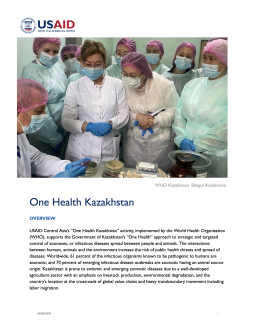OVERVIEW
USAID Central Asia’s “One Health Kazakhstan” activity, implemented by the World Health Organization (WHO), supports the Government of Kazakhstan’s “One Health” approach to strategic and targeted control of zoonoses, or infectious diseases spread between people and animals. The interactions between humans, animals and the environment increase the risk of public health threats and spread of diseases. Worldwide, 61 percent of the infectious organisms known to be pathogenic to humans are zoonotic; and 70 percent of emerging infectious disease outbreaks are zoonotic having an animal source origin. Kazakhstan is prone to endemic and emerging zoonotic diseases due to a well-developed agriculture sector with an emphasis on livestock production, environmental degradation, and the country’s location at the crossroads of global value chains and heavy transboundary movement including labor migration.
GOALS
The “One Health Kazakhstan” activity seeks to address these risks by strengthening and integrating the Government of Kazakhstan’s capacities in both human and animal health systems to prevent, detect, and respond to the control of zoonotic infectious diseases. Two main areas are targeted: (1) establish an enabling environment for implementing One Health cross-cutting efforts; and (2) control of infectious diseases at the human-animal-environment interfaces.
These cross-cutting activities will improve Infection Prevention and Control (IPC) practices; combat antimicrobial resistance (AMR); and implement a One Health national emergency preparedness and response mechanism.
USAID’s One Health Kazakhstan activity is implemented by the WHO, in close partnership with the Ministry of Health, Ministry of Agriculture, and Ministry of Ecology and Natural Resources of the Republic of Kazakhstan, and other national counterparts and stakeholders. The activity strengthens interagency coordination across development agencies and supports collaboration and communication to ensure that efforts are coordinated and complementary.
ANTICIPATED RESULTS
- Effective IPC that enables safe health and essential services delivery and the prevention and control of health care acquired infections.
- A functional system in place for the national response to combat AMR in both the animal and human health system through the One Health approach.
- Operational multi-sectoral and multidisciplinary mechanisms, policies, systems and practices established to minimize the transmission of zoonotic diseases from animals to human populations.
- An effective mechanism established for the coordination and integration of relevant sectors in the implementation of International Health Regulations.
- A regular partners coordination mechanism institutionalized for efficacious use of available resources.
IMPLEMENTATION PERIOD: 2023-2028
BUDGET: $5,400,000
CONTACT: Lola Yuldasheva, Global Health Security Technical Advisor, USAID Regional Mission for Central Asia. Email: lyuldasheva@usaid.gov


